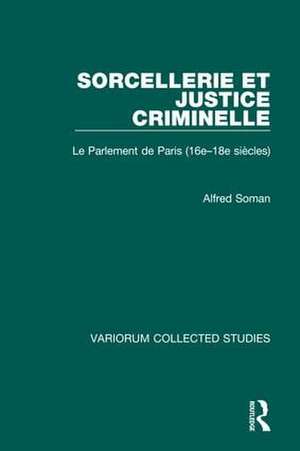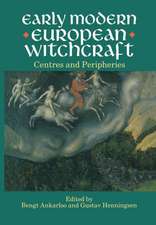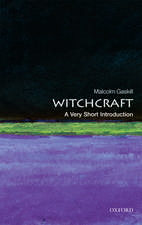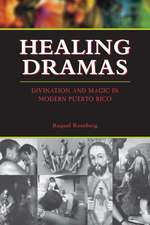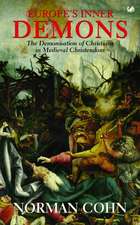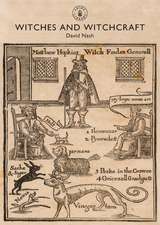Sorcellerie et justice criminelle: Le Parlement de Paris (16e–18e siècles): Variorum Collected Studies
Autor Alfred Somanen Limba Engleză Hardback – 30 apr 1992
Din seria Variorum Collected Studies
-
 Preț: 313.38 lei
Preț: 313.38 lei -
 Preț: 311.41 lei
Preț: 311.41 lei -
 Preț: 299.55 lei
Preț: 299.55 lei -
 Preț: 325.68 lei
Preț: 325.68 lei -
 Preț: 406.12 lei
Preț: 406.12 lei -
 Preț: 311.18 lei
Preț: 311.18 lei -
 Preț: 325.31 lei
Preț: 325.31 lei -
 Preț: 396.01 lei
Preț: 396.01 lei - 9%
 Preț: 1039.89 lei
Preț: 1039.89 lei -
 Preț: 266.20 lei
Preț: 266.20 lei -
 Preț: 343.34 lei
Preț: 343.34 lei - 9%
 Preț: 938.10 lei
Preț: 938.10 lei -
 Preț: 351.48 lei
Preț: 351.48 lei - 9%
 Preț: 938.86 lei
Preț: 938.86 lei -
 Preț: 335.37 lei
Preț: 335.37 lei - 9%
 Preț: 937.14 lei
Preț: 937.14 lei -
 Preț: 351.42 lei
Preț: 351.42 lei -
 Preț: 320.00 lei
Preț: 320.00 lei - 38%
 Preț: 766.84 lei
Preț: 766.84 lei - 23%
 Preț: 315.48 lei
Preț: 315.48 lei - 36%
 Preț: 740.06 lei
Preț: 740.06 lei - 34%
 Preț: 764.20 lei
Preț: 764.20 lei - 39%
 Preț: 684.75 lei
Preț: 684.75 lei - 29%
 Preț: 247.40 lei
Preț: 247.40 lei - 37%
 Preț: 488.89 lei
Preț: 488.89 lei - 38%
 Preț: 766.91 lei
Preț: 766.91 lei - 34%
 Preț: 769.51 lei
Preț: 769.51 lei - 38%
 Preț: 769.85 lei
Preț: 769.85 lei - 36%
 Preț: 823.43 lei
Preț: 823.43 lei - 25%
 Preț: 225.28 lei
Preț: 225.28 lei - 25%
 Preț: 225.54 lei
Preț: 225.54 lei - 34%
 Preț: 767.07 lei
Preț: 767.07 lei - 34%
 Preț: 764.20 lei
Preț: 764.20 lei - 34%
 Preț: 736.38 lei
Preț: 736.38 lei - 34%
 Preț: 738.43 lei
Preț: 738.43 lei - 25%
 Preț: 226.52 lei
Preț: 226.52 lei - 33%
 Preț: 491.66 lei
Preț: 491.66 lei - 34%
 Preț: 485.78 lei
Preț: 485.78 lei - 34%
 Preț: 485.78 lei
Preț: 485.78 lei - 38%
 Preț: 766.34 lei
Preț: 766.34 lei - 36%
 Preț: 739.17 lei
Preț: 739.17 lei - 31%
 Preț: 473.94 lei
Preț: 473.94 lei - 18%
 Preț: 843.63 lei
Preț: 843.63 lei - 38%
 Preț: 774.91 lei
Preț: 774.91 lei - 38%
 Preț: 769.92 lei
Preț: 769.92 lei - 34%
 Preț: 764.20 lei
Preț: 764.20 lei - 50%
 Preț: 488.81 lei
Preț: 488.81 lei - 36%
 Preț: 488.49 lei
Preț: 488.49 lei - 34%
 Preț: 769.10 lei
Preț: 769.10 lei - 38%
 Preț: 766.99 lei
Preț: 766.99 lei
Preț: 770.45 lei
Preț vechi: 1158.26 lei
-33% Nou
Puncte Express: 1156
Preț estimativ în valută:
147.43€ • 157.65$ • 122.92£
147.43€ • 157.65$ • 122.92£
Carte tipărită la comandă
Livrare economică 18 aprilie-02 mai
Preluare comenzi: 021 569.72.76
Specificații
ISBN-13: 9780860783206
ISBN-10: 0860783200
Pagini: 344
Dimensiuni: 150 x 224 mm
Greutate: 0.8 kg
Ediția:1
Editura: Taylor & Francis
Colecția Routledge
Seria Variorum Collected Studies
Locul publicării:Oxford, United Kingdom
ISBN-10: 0860783200
Pagini: 344
Dimensiuni: 150 x 224 mm
Greutate: 0.8 kg
Ediția:1
Editura: Taylor & Francis
Colecția Routledge
Seria Variorum Collected Studies
Locul publicării:Oxford, United Kingdom
Public țintă
Academic and PostgraduateCuprins
Contents: Avant-propos; Les procès de sorcellerie au Parlement de Paris (1565-1640); The Parlement of Paris and the great witch hunt (1565-1640); La sorcellerie vue du Parlement de Paris au début du XVIIe siècle; Deviance and criminal justice in Western Europe, 1300-1800: an essay in structure; Le Registre consistorial de Coutras, 1582-1584; Aux origines de l’appel de droit dans l’Ordonnance criminelle de 1670; La justice criminelle aux XVIe-XVIIe siècles: le Parlement de Paris et les sièges subalternes; Pathologie historique: le témoignage des procès de bestialité aux XVIe-XVIIe siècles; La querelle de l’antimoine: Guy Patin sur la sellette; Un bûcher pour un judaïsant: Jean Fontanier (1621); Le témoignage maquillé: encore un aspect de l’infra-justice à l’époque moderne; La décriminalisation de la sorcellerie en France; Trente procès de sorcellerie dans le Perche (1566-1624); Le rôle des Ardennes dans la décriminalisation de la sorcellerie en France; Decriminalizing witchcraft: does the French experience furnish a European model?; Corrigenda et addenda; Index.
Recenzii
'...represents a very important contribution on the two major fronts indicated by the title. Soman’s work is in many ways a remarkable demonstration of historical method.' English Historical Review
Descriere
The Parlement of Paris was the largest secular court in Christendom. Although its criminal archives have been preserved virtually intact, historians of the period of the great witch trials, as well as scholars of the Ancien Régime in general, have been discouraged by the notorious difficulties of research into them, and have effectively avoided these records. Alfred Soman was the first historian to have undertaken the task. In the fifteen articles republished here, which include both detailed investigations of particular cases and broad-ranging overviews, he contends that criminal justice in the 16th- and 17th-century France was far more humane and less severe than traditional assumptions would suggest. As early as 1588, the High Court began to take steps to restrain indiscriminate witch hunting, particularly in the eastern provinces where prosecutions were instigated not in conformity with, but in defiance of, the highest judicial authority in the land.
